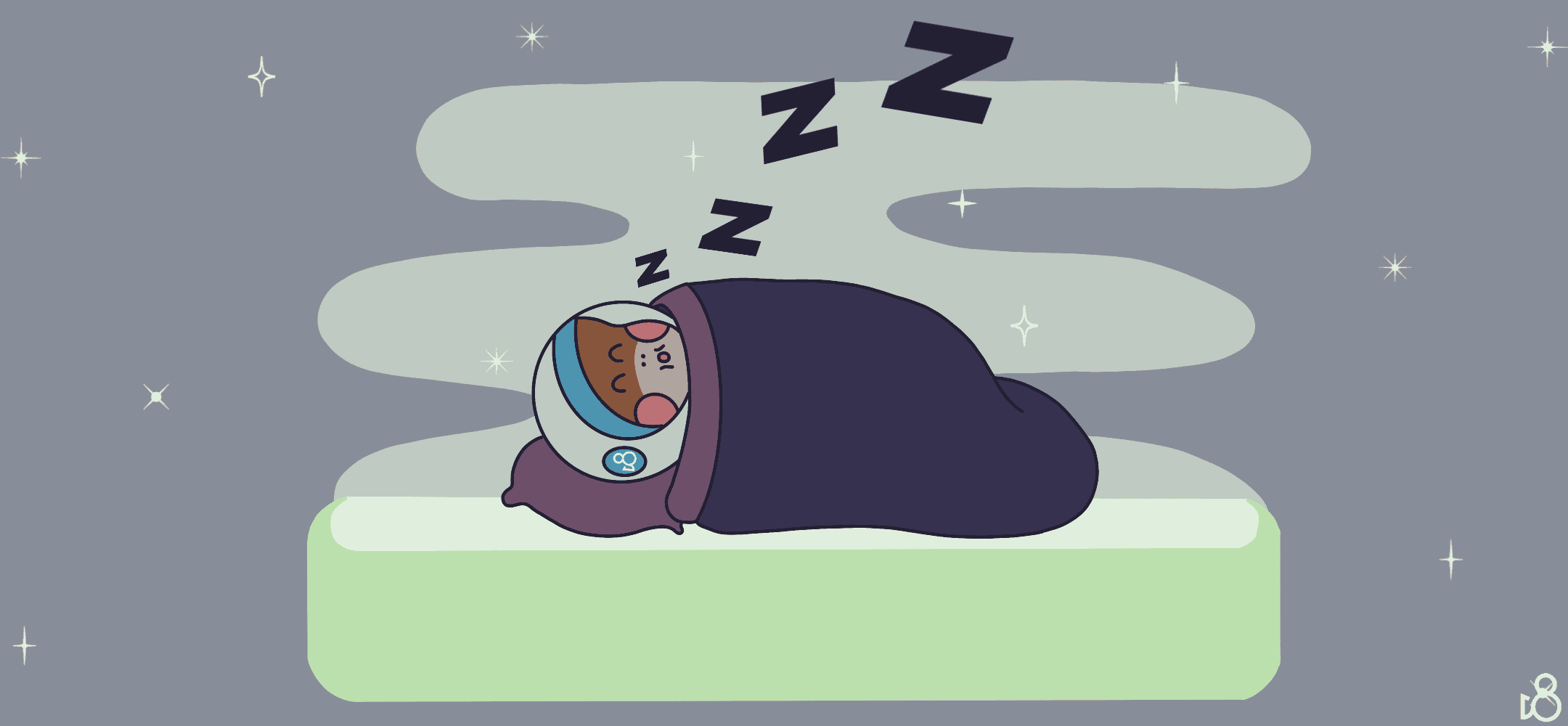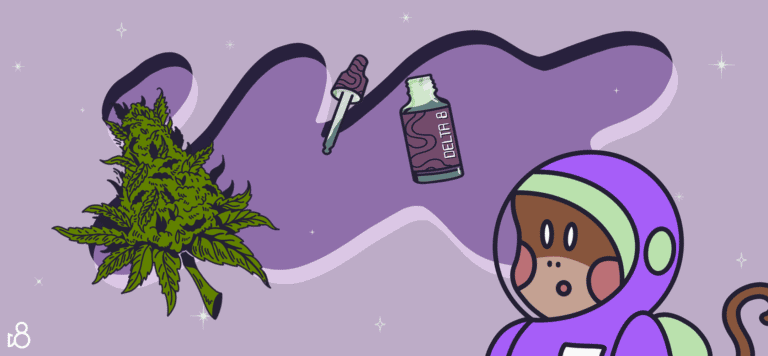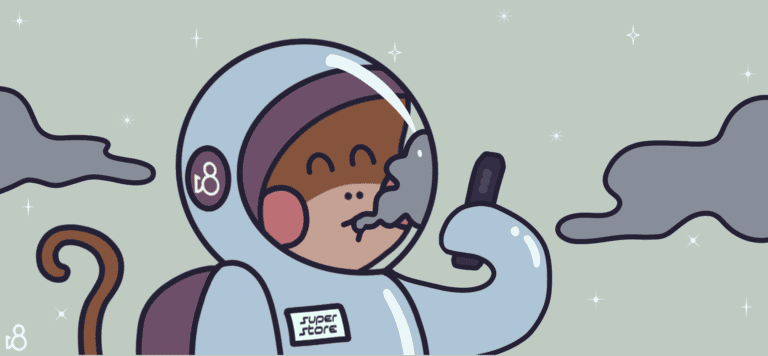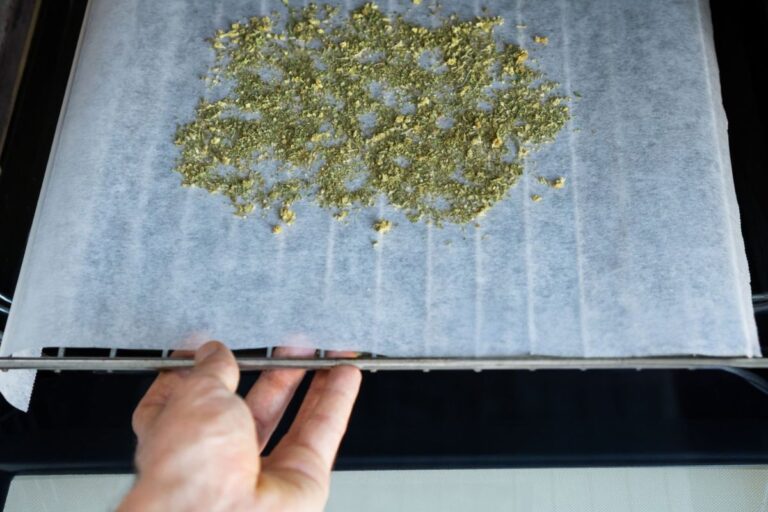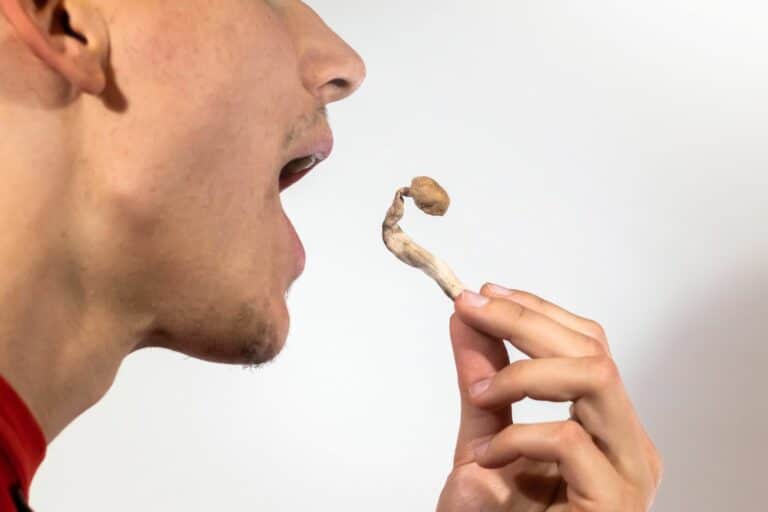Does Delta-8 Help with Sleep? Exploring Its Effects on Slumber
Delta-8 THC, a cousin of the well-known Delta-9 THC, is making waves for its impressive knack for enhancing sleep quality. While Delta-9, famous for its ties to marijuana, might stir the pot with excitement, Delta-8 is like the chill cousin promising a stress-free ride. Anyone looking for a ticket to dreamland should definitely check out what Delta-8 might have to offer for those blissful z’s.
Though research on Delta-8 is not as extensive as on Delta-9, anecdotal accounts suggest that this cannabinoid might help with sleep-related issues. With an array of Delta-8 products available, from gummies to vapes, individuals seeking a good night’s rest are turning to this compound for its potential to promote relaxation and assist in managing sleep disturbances. However, it’s essential to navigate these claims with a critical eye, as the scientific community is still examining the efficacy and safety of Delta-8 for sleep.
- What Is Delta-8 THC?
- Delta-8 THC and Sleep
- Potential Benefits of Delta-8 for Sleep
- Usage and Dosing of Delta-8 for Sleep
- Risks and Side Effects
- Delta-8 THC and Other Conditions
- Comparative Analysis
- Consumer Considerations
- The Future of Delta-8 THC Research
- Conclusion
- Frequently Asked Questions
- What are the effects of Delta-8 gummies on sleep quality?
- How do Delta-8 and Delta-9 compare in their impact on insomnia?
- Can Delta-8 products enhance relaxation before bedtime?
- Are there specific Delta-8 strains recommended for improving sleep?
- How does Delta-8’s safety profile measure up for use as a sleep aid?
- In what ways does CBD differ from Delta-8 when used for sleep improvement?
What Is Delta-8 THC?
Delta-8 THC is a cannabinoid that has gained attention for its similarities and differences with its more prominent counterpart, Delta-9 THC. Understanding its chemical structure, effects, and legal status is essential as you navigate through the complex world of cannabis products.
Understanding Cannabinoids
Cannabinoids are a group of active compounds found in the cannabis plant. Delta-8 THC (Delta-8-tetrahydrocannabinol) is a psychoactive cannabinoid, similar to Delta-9 THC, the most well-known form of THC associated with the potent effects of marijuana. Compared to Delta-9, Delta-8 THC tends to have a lower psychoactive potency. It binds to the endocannabinoid system in your body, which is responsible for regulating various physiological processes, including mood, appetite, and sleep.
The Legal Status of Delta-8 THC
The legal landscape of Delta-8 THC is complex and largely hinges on the 2018 Farm Bill. This federal law legalized hemp-derived cannabinoids, which classifies Delta-8 THC as legal if derived from hemp containing less than 0.3% Delta-9 THC on a dry weight basis. Despite this, some states have specifically outlawed Delta-8 THC or have not yet clarified their stance, making it a gray area federally and a clear illegal substance under certain state laws. It is crucial to check your state’s regulations on Delta-8 THC before purchasing or using it.
Delta-8 THC and Sleep

Delta-8 THC has gained attention for its potential sleep-related benefits, often compared to other cannabinoids for effectiveness and offering a different experience in sleep quality.
Comparing Delta-8 to Other Cannabinoids
Delta-8 is just one of many cannabinoids derived from the cannabis plant. Unlike its close relative, Delta-9 THC, which is known for a more potent psychoactive effect, Delta-8 is reported to induce a milder, more clear-headed experience. It’s likened to CBD (cannabidiol), which is non-psychoactive and valued for its therapeutic effects, including sleep aid potential. However, Delta-8 is unique in that it binds to both CB1 and CB2 endocannabinoid receptors in the brain, which plays a role in modulating sleep.
Delta-8 and Sleep Quality
Use of Delta-8 for improving sleep quality has become popular, particularly among those seeking a sleep aid without the more intense effects of Delta-9 THC. Consumers are finding it beneficial for managing insomnia and improving sleep cycles, though these effects may vary by individual. Anecdotal evidence suggests that Delta-8 may also contribute to more restful REM sleep, which is a critical phase for feeling rejuvenated. It’s important to note that research on Delta-8 is still in its early stages, and its effectiveness as a sleep aid requires more scientific validation.
How Delta-8 Affects the Endocannabinoid System
Delta-8 interacts with the endocannabinoid system (ECS), a complex network in your body that plays a key role in regulating sleep among many other functions. The ECS consists of endocannabinoid receptors found throughout the body, including two primary types: CB1, predominantly located in the central nervous system, and CB2, found mainly in your peripheral organs. Delta-8 binds to these receptors, potentially affecting the release of neurotransmitters in the brain, and thereby influencing circadian rhythm and sedative effects conducive to sleep. The subtler effects of Delta-8 compared to Delta-9 THC can be attributed to its different molecular structure, which alters how it interacts with CB1 and CB2 receptors.
Potential Benefits of Delta-8 for Sleep
Delta-8 THC, a cannabinoid derived from the cannabis plant, has been gaining attention for its potential therapeutic effects, particularly in the realm of sleep improvement. Research suggests that its properties may address specific issues like anxiety and pain which can interfere with restful sleep.
Anti-Anxiety Effects
Delta-8 has been noted for its anti-anxiety properties, which may help alleviate stress and promote relaxation. By potentially reducing anxiety levels, delta-8 can create a more conducive environment for sleep, helping you to fall asleep faster and stay asleep longer. Individual experiences suggest that it can improve mood and provide a calming effect before bedtime.
Pain-Relieving Properties
Chronic pain can significantly disrupt sleep patterns. Delta-8 exhibits pain-relieving effects that might reduce discomfort and lessen inflammation, thereby facilitating better sleep quality. Users report that delta-8 THC has helped them manage pain which otherwise impeded their ability to find comfortable, restorative rest.
Influence on Appetite and Digestion
Some evidence indicates that delta-8 might positively affect appetite and digestion, which in turn could influence sleep. An anti-nausea effect is one aspect of delta-8 that can be beneficial, particularly for individuals who experience sleep disturbances related to digestive issues or treatment-related nausea. Improved digestion before bed can lead to a more comfortable and undisturbed night’s sleep.
Usage and Dosing of Delta-8 for Sleep

When considering Delta-8 for sleep, understanding the various product forms and recommended dosages is crucial for achieving desired effects without overconsumption.
Different Forms of Delta-8 Products
Delta-8 THC comes in multiple forms, each with specific usage methods:
- Edibles and Gummies: Convenient for consistent dosing, with effects that may last longer due to metabolism through digestion.
- Tinctures: Drops under the tongue for quicker onset; dosage can be precisely adjusted.
- Flower: Smoked or vaporized; offers rapid onset but harder to dose accurately.
- Pills: Similar to edibles in terms of consistent dosing and longer-lasting effects.
- Vapes: Quick onset; dosage varies by puff and concentration.
Optimal Dosing Recommendations
To determine the optimal dose of Delta-8 THC for sleep:
- Start Low: Begin with a small dose, possibly around 5-10 mg, and assess your reaction.
- Consult a Medical Professional: Always talk to a healthcare provider to ensure Delta-8 is safe for your use, considering any medical conditions or other medications.
- Increment Slowly: Gradually increase dosage if necessary, taking into account that tolerance can develop with regular use.
- Respect Individual Differences: Dosage can differ widely based on individual body weight, tolerance, and desired effects.
Remember, less is often more with Delta-8 THC, and finding the right balance may require a period of adjustment.
Risks and Side Effects
When considering Delta-8 THC for sleep, it’s important that you are aware of both the potential risks and the side effects involved. While some individuals report benefits, others may experience unwanted reactions or health concerns.
Understanding Potential Risks
Delta-8 THC is a psychoactive compound, much like Delta-9 THC, which you may know as the primary psychoactive component in cannabis. Although Delta-8 is often touted as having milder psychoactive effects, it is not without its risks. Users have reported an increased heart rate as a reaction, which can be uncomfortable or potentially alarming. There’s also the possibility of a dry mouth, changes in memory, and variation in individual experiences, which emphasizes the need for a cautious approach.
Managing Side Effects
Side effects of Delta-8 THC can include but are not limited to:
- Dry mouth: A common experience that can usually be managed with increased fluid intake.
- Sedative effects: While this can be beneficial for sleep, it may impair your ability to perform tasks that require full alertness.
When introducing Delta-8 THC to your routine for sleep, begin with a low dose to understand how your body reacts. It’s vital to remember that tetrahydrocannabinol (THC) affects people differently and what works for one person may not for another. Keeping track of your reactions may help you manage side effects effectively.
Delta-8 THC and Other Conditions

Delta-8 THC has caught attention not only for its potential in aiding sleep but also for its reported effects on anxiety and stress management. Understanding its impact on various conditions can help you consider whether Delta-8 might be suitable for your needs.
Impact on Anxiety and Stress
If you’re grappling with anxiety or stress, knowing that Delta-8 THC has properties that may alleviate these feelings could offer comfort. It’s been noted for creating a calm and focused experience, which may differ from Delta-9 THC’s more intense effects. Some users have found Delta-8 to be more manageable than its more potent counterpart when dealing with daily tensions.
Sedative Effects Beyond Sleep Disorders
Beyond sleep disorders like insomnia, the sedative properties of Delta-8 THC may benefit those with REM sleep behavior disorder and PTSD, which can both disrupt sleep patterns. Its use might also offer a gentler approach to sedation compared to traditional treatments, potentially leading to fewer disruptions in the REM stage of sleep or aiding in the management of PTSD-related symptoms. Its effects on depression remain under investigation, but as with any compound impacting mood and cognition, it’s crucial to consult with healthcare professionals before use.
Comparative Analysis

In exploring the effects of Delta-8 THC on sleep, understanding its relation to other cannabinoids is crucial. This comparative analysis will shed light on how Delta-8 THC stands against Delta-9 THC and CBD, focusing on their impact on slumber.
Delta-8 THC vs. Delta-9 THC
Delta-8 THC is a cannabinoid found in hemp and cannabis plants and is similar to Delta-9 THC, the primary psychoactive component in marijuana. However, Delta-8 is often perceived as a milder form of THC. According to research, individuals seeking sleep support may find Delta-8 THC to be beneficial. This is because it elicits relaxation without the intense high associated with Delta-9 THC. Moreover, some users report fewer occurrences of paranoia and anxiety with Delta-8, which can contribute to a more tranquil sleep environment. For instance, a study highlighted a scenario where Delta-8 THC was used to treat sleep issues or insomnia.
Delta-8 THC vs. CBD
CBD, or cannabidiol, is another well-known cannabinoid derived from the hemp plant, known for not being psychoactive. Unlike Delta-8 THC, CBD doesn’t produce a psychoactive effect, meaning it won’t get you high. In the context of sleep, CBD has been suggested to assist with relaxation and reduce symptoms like anxiety that could disrupt sleep. Delta-8 THC may offer more pronounced psychoactive effects that could facilitate joy and relaxation that is conducive to sleep. However, the type of cannabinoid a person might prefer for sleep can vary widely based on individual experiences and the desired level of intoxication. There’s evidence pointing out the reduction in anxiety or sleep issues with Delta-8 THC, aligning it closer to Delta-9 in terms of psychoactive experiences, but with a potentially more manageable profile.
Consumer Considerations

When exploring the use of Delta-8 for sleep improvement, it’s critical to assess the quality of Delta-8 products and understand the legal and safety landscape surrounding its use.
Finding Quality Delta-8 Products
When searching for Delta-8 products, look for reputable brands that provide transparent information about their extraction methods and the potency levels of their offerings. Look for products that include comprehensive lab reports detailing the presence of terpenes and confirm that the Delta-8 has been derived through safe conversion practices from legally-grown hemp. These reports should also verify that the product is free from contaminants.
- Always check whether the product:
- Lists potency and terpene profiles
- Offers third-party lab test results
- Specifies the extraction method used
Legal and Safety Implications
Delta-8’s legal status is nuanced. It is psychoactive, although typically less so than Delta-9 THC, the main psychoactive component in marijuana. Due to this, ensure you are up-to-date with your local legal requirements as federal and state laws may differ. Some states have clear restrictions on all hemp derivatives, including Delta-8.
- Remember the following for complying with laws:
- Federal law allows hemp-derived products, but individual states may still restrict them
- Confirm the legality of Delta-8 in your state
- Be aware that Delta-8 is a psychoactive substance and treat it with respect for your safety
The Future of Delta-8 THC Research
The ongoing exploration of Delta-8 THC’s therapeutic potential is a point of significant interest, particularly regarding its effects on sleep and the endocannabinoid system.
Current Research and Developments
Current research efforts are gradually shedding light on the unique interactions Delta-8 THC has with the endocannabinoid system (ECS), which plays a crucial role in regulating sleep, among other physiological processes. Studies have found that the binding affinity of Delta-8 THC to ECS receptors may influence sleep-related mechanisms differently than Delta-9 THC, commonly found in cannabis plants. This relationship suggests Delta-8 may have sedating properties that could facilitate better sleep, particularly when derived from indica strains known for their relaxing effects.
Insights gathered from research on other cannabinoids, like CBD, have led scientists to investigate whether Delta-8 could similarly impact dreams and memories associated with dreaming. For instance, research is probing into whether Delta-8 could attenuate vivid dreams or nightmares, offering potential therapeutic applications for those with disruptive sleep patterns.
Insights from Medical Professionals
Medical professionals are taking a keen interest in the application of Delta-8 THC as a possible medication to address sleep disorders. Their insights point to an urgent need for comprehensive, high-quality trials to confirm anecdotal evidence suggesting Delta-8’s sleep aid capabilities. Given the therapeutic applications observed with other cannabinoids, there is a growing dialogue among healthcare providers about the potential of Delta-8 THC in treatment protocols.
Notably, healthcare practitioners are mindful of the herbal origins of Delta-8, drawing parallels to other plant-based treatments like lavender, which has been utilized for its calming properties. This comparison underscores a broader trend towards integrating plant-derived compounds, such as those from sativa or indica cannabis plants, into modern medicine. Medical professionals emphasize the importance of understanding the effects of Delta-8 on the ECS to more confidently prescribe it for sleep and other health issues.
Conclusion
From the evidence gathered, Delta-8 THC appears to have a potential impact on sleep patterns. It is reported that this cannabinoid may enhance relaxation and possibly improve sleep for some individuals. Studies suggest that around half of the participants use Delta-8 THC for sleep-related issues.
Your consideration of Delta-8 should take into account that while some find it effective for sleep disturbances, responses can be subjective and vary from person to person. It is important to note that the research on Delta-8 THC is still evolving, and conclusions on its efficacy and safety are yet to be firmly established.
If you are considering Delta-8 THC as a sleep aid, please consult with a healthcare provider to understand how it might affect you, particularly because it is a substance with limited long-term study. It’s also crucial to identify legal status and quality assurance of Delta-8 THC products, as regulation may vary by region and can impact product purity.
Finally, while some users report benefits for sleep and relaxation, be aware of the potential for varying effects based on individual factors such as overall health, the presence of other medications, and personal tolerance to THC products.
Frequently Asked Questions
In this section, you’ll find answers to commonly asked questions about the use of Delta-8 for sleep-related concerns, including its effects and comparisons with related substances.
What are the effects of Delta-8 gummies on sleep quality?
Delta-8 gummies may improve sleep quality by promoting relaxation. Some users have reported that taking these gummies before bedtime helped them to fall asleep more easily and experience a more restful night’s sleep.
How do Delta-8 and Delta-9 compare in their impact on insomnia?
Compared to Delta-9, Delta-8 tends to have milder psychoactive effects. This could make Delta-8 potentially more suitable for those with insomnia, as it might offer the sedative benefits without the intense high associated with Delta-9.
Can Delta-8 products enhance relaxation before bedtime?
Yes, Delta-8 products are known to enhance relaxation, which can be beneficial before bedtime. They have been reported to help with winding down after a long day and prepare the body and mind for sleep.
Are there specific Delta-8 strains recommended for improving sleep?
There are strains of Delta-8 that users recommend for sleep, often those higher in myrcene, a terpene reputed for its sedative properties. Individual experiences may vary, so it’s suggested to find a strain that works best for you.
How does Delta-8’s safety profile measure up for use as a sleep aid?
Delta-8 is generally considered to have a good safety profile when used responsibly as a sleep aid. However, research is ongoing, and users should be mindful of their reactions and consult healthcare professionals if necessary.
In what ways does CBD differ from Delta-8 when used for sleep improvement?
CBD is non-psychoactive and is primarily known for its relaxing effects without causing a high, whereas Delta-8 can induce mild psychoactive experiences. Both can be used for sleep improvement, though their effects on the user can differ markedly.

